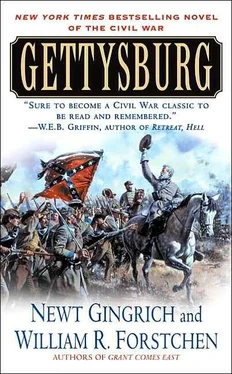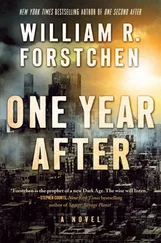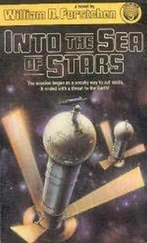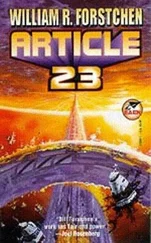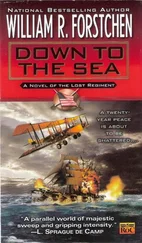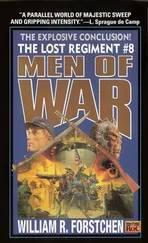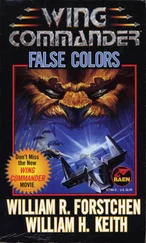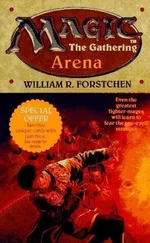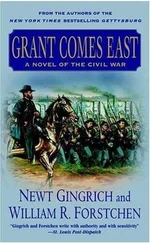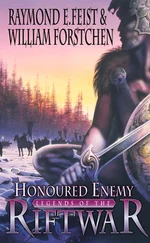William Forstchen - Gettysburg
Здесь есть возможность читать онлайн «William Forstchen - Gettysburg» весь текст электронной книги совершенно бесплатно (целиком полную версию без сокращений). В некоторых случаях можно слушать аудио, скачать через торрент в формате fb2 и присутствует краткое содержание. Жанр: Исторические приключения, на английском языке. Описание произведения, (предисловие) а так же отзывы посетителей доступны на портале библиотеки ЛибКат.
- Название:Gettysburg
- Автор:
- Жанр:
- Год:неизвестен
- ISBN:нет данных
- Рейтинг книги:5 / 5. Голосов: 1
-
Избранное:Добавить в избранное
- Отзывы:
-
Ваша оценка:
- 100
- 1
- 2
- 3
- 4
- 5
Gettysburg: краткое содержание, описание и аннотация
Предлагаем к чтению аннотацию, описание, краткое содержание или предисловие (зависит от того, что написал сам автор книги «Gettysburg»). Если вы не нашли необходимую информацию о книге — напишите в комментариях, мы постараемся отыскать её.
Gettysburg — читать онлайн бесплатно полную книгу (весь текст) целиком
Ниже представлен текст книги, разбитый по страницам. Система сохранения места последней прочитанной страницы, позволяет с удобством читать онлайн бесплатно книгу «Gettysburg», без необходимости каждый раз заново искать на чём Вы остановились. Поставьте закладку, и сможете в любой момент перейти на страницу, на которой закончили чтение.
Интервал:
Закладка:
He ignored, as well, the garbled order that came from Meade's headquarters to fall back onto the Gettysburg-Westminster Road, saying that would take his command straight into the trap.
When he judged the time to be right he ordered the position along Pipe Creek to be abandoned, along with all guns and wagons and those wounded who could not walk, each man to load up a hundred rounds of ammunition, and then set the corps off on a grueling march to the northwest cutting far behind Lee's flanking force, an action that when first reported to Lee, caused an hour of tense anxiety until it was realized that Sickles was making for Harney and the road back to Gettysburg. Lee decided to simply let this command go; to try and bring it into the net would overextend an already exhausted and far overextended command.
The march would be the most harrowing the Third Corps had ever endured, a nightmare of slogging through the mud, exhausted men by the hundreds collapsing and Dan Sickles relentlessly setting the pace and already lecturing to his staff about why Meade had lost the battle. He had mis-stepped every inch of the way, and if only he had listened, just listened, how different it would all be, Sickles announced with self-righteous bitterness. He would be damned if ever he would take an order from such a man ever again. His mission now was to save his men and, around the nucleus of the Third Corps, rebuild an army, this time with the right general in command. After all the failures, Lincoln would have to buckle to that; Sickles's Democrat war allies in Congress would see that Sickles now had his chance. In fact, if Lincoln had picked him instead of Meade, Lee would be defeated and his army broken, or so Sickles reasoned to himself, increasing his own anger and determination.
Sedgwick felt as angry as Sickles and as bitter at Meade. Already word was spreading that Meade was now blaming him for the failure, that Sedgwick had failed to advance when he should have, then failed to stop when he should have, thus destroying the reserve that could have been used to punch a way out The fact that Hancock had usurped command would be an issue that Sedgwick would make sure he answered for, and, if need be, he would take it all the way to the Congressional Joint Committee on the Conduct of the War and demand a court-martial as well as a congressional investigation.
Hancock knew nothing of this. His ambulance had passed through Littlestown only minutes before the road was blocked, his escort of loyal men pushing on toward Gettysburg. The word was already out that Stuart's men were closing in on the rear, having brushed aside the disjointed efforts of the Union cavalry to contain them. At Gettysburg, there might be safety with the men of Eleventh Corps, who still occupied the town.
The death blow hit just before six in the evening. Longstreet had waited, resting his men, bringing up rations, though the meal was a cold one of soggy hardtack and salted pork, but it was rations nevertheless. Units were reorganized; dry ammunition was distributed; a dozen batteries were organized and limbered up.
He knew the plan, watching the weather, trying to calculate. No word came from Lee, but Longstreet sensed that the flanking attack had indeed gone in, the distant sound of gunfire fading northward, by then washed out by the intensity of the storm.
Finally, just after five-thirty, he ordered a general advance all along the line. It was evident that there were still troops deployed along the opposing heights, but all could see, as well, that since the previous two hours that line was melting away, guns moving out, skirmishers bringing in prisoners who reported that the Army of the Potomac was abandoning the field.
Three divisions went in: Rodes on the right, Pettigrew in the middle, Early on the left. Pender, McLaws, and Anderson, those who had suffered the most in the defense, were formed into marching columns and held in reserve, with Anderson's division detailed off to the task of preparing to receive the anticipated flood of prisoners. And for once there was a surplus of supplies and an order to prepare to feed these thousands of men as well.
The orders were to avoid a frontal assault at all cost, to probe; to go around the flanks, for Pete sensed that if anyone was still up there, they would fold once their flanks were turned, but would indeed fight if hit head-on.
It was as he assumed. The First Corps held for less than half an hour, with Rodes only skirmishing at long range, until Early's men swept over the heights abandoned by Sickles. With that the First Corps of the Army of the Potomac, the "old First"-the men who boasted that they were the backbone-broke and started for the rear.
With Pender's column pushing up the road, the pursuit was on in earnest, but the advance was determined and careful. The goal was to herd the Union army north and gather up stragglers as prisoners, not to engage in a frontal fight that would force the Union army to draw itself together and cause unnecessary casualties to the already weakened Confederate forces.
A thunderstorm of frightful intensity now lashed the skies, as if reflecting the far more violent confrontation unfolding below. In the darkening gloom, the hot electric blue flashes revealed a road swarming with tens of thousands of men, all semblance of order breaking down among the Union forces, troops splitting away from the line of retreat, streaming off into nearby woods, there to simply collapse. Individual regimental commanders, those with some initiative, ordered their men to turn aside, to march cross-country, hoping to break out of the net For word raced up and down that desperate column that Lee was now in their front on the Baltimore Pike at Littlestown, and Longstreet was closing up from the rear.
It was the worst night of the war for both sides.
For the men of the old Irish Brigade, Second Corps, haunted by the loss of their commander, there was a vicious lashing out when a regiment of Pender's division stormed into the road expecting a quick surrender.
To a man, the Irishmen turned with clubbed rifles and bayonets. It was a brutal vicious melee, no longer a military battle; now it was a settling of scores, and men on both sides were beaten to death without mercy in the gloom, until the survivors broke from the road and spilled into the darkness, heading due east and out of the fight but leaving more than a hundred dead Confederates behind.
All organization at corps and division and even brigade level was gone.
With the road severed at Littlestown, the vast, surging column had come to a complete halt unable to move. Some regiments just stood in line, waiting and waiting in the driving rain-a colonel or in many cases now a major or even a captain in command-for someone to tell them what to do, until the enveloping wave of gray and butternut swarmed in about them.
Here and there fires briefly flickered to light as a lantern was smashed, the coal oil poured over the regimental colors, and then burned; or like their comrades of the Twentieth Maine, the flag was cut to ribbons and pressed into hands, men weeping in rage, frustration, bitterness, and exhaustion.
Every farmhouse, every barn and outbuilding, became a refuge, filled to overflowing with the wounded and with those too exhausted or too frightened to continue.
Strange moments, only possible in this war unfolded, and acts typical of any war. A soldier with one of Pender's North Carolina divisions, coming upon an exhausted Union straggler, discovered him to be his own son who had moved to Ohio before the war, the two embracing and weeping by the side of the road, while less than a hundred yards away another North Carolinian unknowingly shot his own brother in the back when the latter tried to flee.
In nearly every case, prisoners were taken in and treated with at least some compassion, a quick bandaging of wounds, a shared drink from a canteen, though a Georgian, moved to insanity by the death of his brother earlier in the day, methodically stabbed a wounded boy from New York to death as the boy begged for mercy; and then, within seconds, the murderer was summarily executed by his own colonel, who had witnessed the crime.
Читать дальшеИнтервал:
Закладка:
Похожие книги на «Gettysburg»
Представляем Вашему вниманию похожие книги на «Gettysburg» списком для выбора. Мы отобрали схожую по названию и смыслу литературу в надежде предоставить читателям больше вариантов отыскать новые, интересные, ещё непрочитанные произведения.
Обсуждение, отзывы о книге «Gettysburg» и просто собственные мнения читателей. Оставьте ваши комментарии, напишите, что Вы думаете о произведении, его смысле или главных героях. Укажите что конкретно понравилось, а что нет, и почему Вы так считаете.
